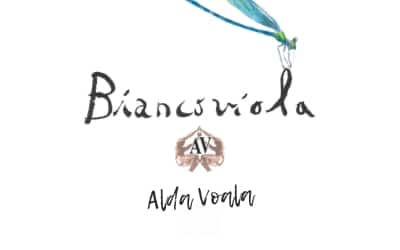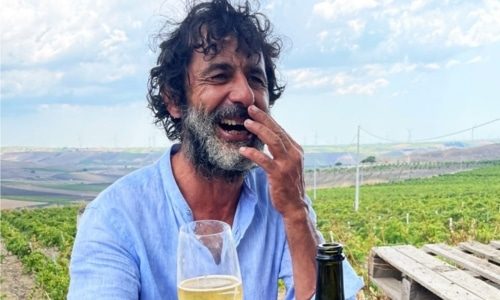
Aldo Viola
Aldo Viola is a man in motion, literally and figuratively—constantly moving, gesturing, smiling, and exclaiming, and always searching for ways to coax greater expressiveness from his inspiringly personal wines. Born in the late 1960s into a winemaking family in Alcamo, in the northwest corner of Sicily, Aldo helped his father around the winery as a boy, but his path to becoming an iconoclastic producer in his own right was far from straight and narrow. He was a professional footballer for several years, and he still carries that boundless energy around with him. He spent significant time in Denmark, India, and the Amazon.
In 1996, he returned to work with his father, later studying enology in Marsala, 70 kilometers west of his home village, and becoming the first enologist of the Centopassi cooperative—an entity that utilized land confiscated from the Corleonesi mafia following the arrest of the notorious Salvatore “Totò” Riina in the early 1990s. Given the mafia’s longstanding punishment of those who make use of their formerly held turf, Aldo’s position here required steel nerves—the kind of bravery that makes the courage to ferment spontaneously and use little-to-no sulfur look tame in comparison. Aldo’s brother Alessandro is a skilled winegrower in his own right, but instead of joining his brother to continue the family vocation, Aldo—a resolutely and stubbornly independent-minded person—has forged his own path over the years.
Today, he farms seven hectares of Catarratto, Grillo, and Grecanico near his home village of Alcamo, planted on the area’s steep Timpi Rossi (“Red Hills”), named so because of the soil’s high iron content. He also owns a plot of land 30 kilometers outside of town, closer to the sea, planted to Perricone, Nerello Mascalese, and Syrah, all of which thrive in the dry and scorching-hot microclimate of the area. Aldo works without synthetic chemicals in the vineyards, harvesting everything by hand and conducting almost all vineyard work entirely manually as well. He has long embraced skin maceration in the production of his white wines. Aldo does this because he finds that long, slow extractions produce the truest expressions of variety-plus-soil as well as the most satisfying textures.
As with his career path, Aldo’s approach in the cellar has changed over the years: he used to employ no sulfur whatsoever, but has begun adding miniscule amounts to maintain purity of expression and to keep potentially overwhelming flaws at bay. He also experimented with terracotta jars some years back, but ceased working with them because trace amounts of heavy metals found their way into his wines, and because they weren’t large enough to adequately allow for his favored method of extraction: allowing the weight of the bunches to do the work rather than employing excessive punch-downs and pump-overs.

est 2005
© 2025 Vino Veritas, All Rights Reserved





